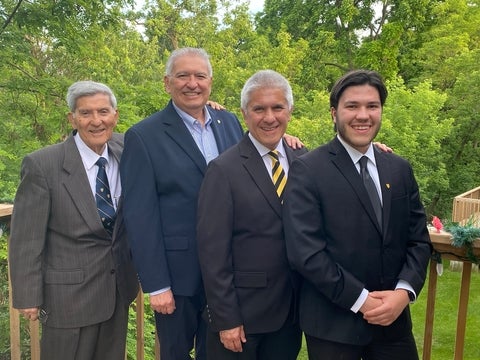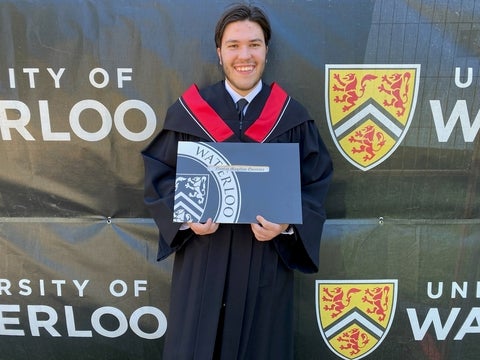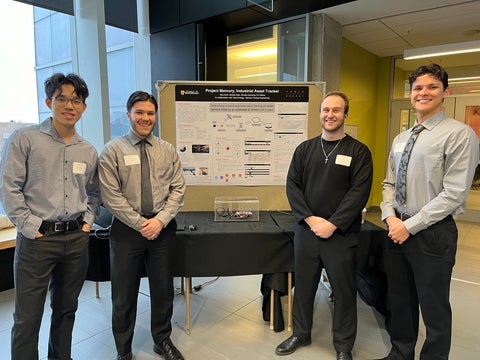Nicolas Quintana (BASc ‘24, electrical and computer engineering), crossed the stage at convocation this year cheered on by his family of University of Waterloo alumni and ex-faculty.
In this Q&A, Quintana shares highlights from his student experience, and how his family’s close ties to each other and to Waterloo helped set him up for success.
What is your family’s connection to Waterloo?
My grandfather Dr. Victor Quintana was a professor in Waterloo’s Department of Electrical and Computer Engineering for 30 years — he retired in 2011 and was honoured with the Distinguished Professor Emeritus award — and my grandmother Mone Quintana worked at the Dana Porter Library for 29 years. Their sons, my father Dr. Yuri Quintana and uncle Victor Hugo Quintana, are Waterloo Engineering alumni and both studied electrical and computer engineering. My mother Brenda Quintana is a Waterloo Arts alum — my parents met on campus, so Waterloo is an extra special place for them.
How does it feel to continue the legacy?
My graduation was an incredibly special event, for all of us. It felt like the culmination of all the education I’ve received in my life so far, including everything I’ve learned from my family.
With their support, my girlfriend and her family’s support, as well as support from faculty members, I made it through every semester of my degree to walk that stage at convocation. And they were all there to celebrate with me, I was on top of the world.
How are you following — and not following — in your family’s footsteps?
I followed them to Waterloo and to the Department of Electrical and Computer Engineering, but my degree focused on computer engineering and that program didn’t exist when my father and uncle were students.
We also differ in that they went straight into their master’s degrees, but I’ve decided to get some work experience before starting my graduate studies. I want to make an informed decision about what to specialize in and then choose the best graduate program to fit my ambitions.
Given that my grandfather and father hold PhDs — in fact, my dad did both his master’s and PhD degrees at Waterloo in systems design engineering — and mother and uncle have master’s degrees, I’m not done yet.

Three generations of Waterloo Engineers! From left to right: Dr. Victor Quintana (grandfather), Victor Hugo Quintana (uncle), Dr. Yuri Quintana (father) and Nicolas Quintana.

Nicolas Quintana at graduation
You grew up in the U.S. but chose Canada for your studies, why?
I applied to schools in both countries but quality post-secondary education is much more affordable in Canada. Also, choosing Canada was a way for me to reconnect with my roots. I was born in London, Ontario to Canadian parents and then we moved to the U.S. when I was two years old. I wanted to get to know Canada and its people — in a way the past four years have been like a homecoming for me.
Waterloo was obviously on my radar because of my family, but also because its Engineering Faculty and co-op program are highly respected. One of the U.S. schools I considered has the largest co-op program in the U.S., but it's still smaller in volume than Waterloo.
How was your co-op experience?
I worked in a shipyard in Vancouver which was wonderful. And I worked at a company that laid off most of its co-op students which was unpleasant. Both experiences taught me a lot about the good and the not so good of the business world — and both helped me build my professional network.
But my co-op term at Tesla in California was the real game-changer. While working there, my Waterloo Capstone Design team and I were trying to decide what project we could do. I asked my boss if Tesla had a problem that needed solving and if we could tackle it for Capstone — he said yes. In partnership with Tesla we developed Project Mercury, an automated inventory tracking system that is projected to save the company significantly in service costs.
Now that you’re a Waterloo Engineering alum, where are you headed?
Back to California. Tesla offered me a job to continue working on Project Mercury. It’s a dream come true.

Project Mercury from left to right: Braden Mah, Nicolas Quintana, Eli Vlahos and Kyle Dyck.